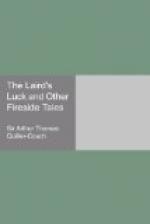“Take! They were two war frigates, I tell ’ee!”
“Iss, iss; don’t lose your temper. All I managed to take was this young French orcifer here; but I thought, maybe, that you—having a handier craft—”
Jacka chuckled a bit; but he wasn’t one to keep a joke going for spite.
“Look-y-here, Cap’n,” he said; “I’ll hear your tale when we get into dock, and you shall hear mine. What I want ’ee to do just now is to take this here lugger again and sail along in to Plymouth with her as your prize. I wants, if possible, to spare the feelin’s of this young gentleman, an’ make it look that he was brought in by force. For so he was, though not in the common way. An’ I likes the fellow, too, though he do kick terrible hard.”
* * * * *
They do say that two days later, when Cap’n Jacka walked up to his own door, he carried the cinder-sifter under his arm; and that, before ever he kissed his wife, he stepped fore and hitched it on a nail right in the middle of the wall over the chimney-piece, between John Wesley and the weather-glass.
THE POISONED ICE
We were four in the patio. And the patio was magnificent, with a terrace of marble running round its four sides, and in the middle a fountain splashing in a marble basin. I will not swear to the marble; for I was a boy of ten at the time, and that is a long while ago. But I describe as I recollect. It was a magnificent patio, at all events, and the house was a palace. And who the owner might be, Felipe perhaps knew. But he was not one to tell, and the rest of us neither knew nor cared.
The two women lay stretched on the terrace, with their heads close together and resting against the house wall. And I sat beside them gnawing a bone. The sun shone over the low eastern wall upon the fountain and upon Felipe perched upon the rim of the basin, with his lame leg stuck out straight and his mouth working as he fastened a nail in the end of his beggar’s crutch.
I cannot tell you the hour exactly, but it was early morning, and the date the twenty-fourth of February, 1671. I learnt this later. We in the patio did not bother ourselves about the date, for the world had come to an end, and we were the last four left in it. For three weeks we had been playing hide-and-seek with the death that had caught and swallowed everyone else; and for the moment it was quite enough for the women to sleep, for me to gnaw my bone in the shade, and for Felipe to fasten the loose nail in his crutch. Many windows opened on the patio. Through the nearest, by turning my head a little, I could see into a noble room lined with pictures and heaped with furniture and torn hangings. All of it was ours, or might be, for the trouble of stepping inside and taking possession. But the bone (I had killed a dog for it) was a juicy one, and I felt no inclination to stir. There was the risk, too, of infection—of the plague.




